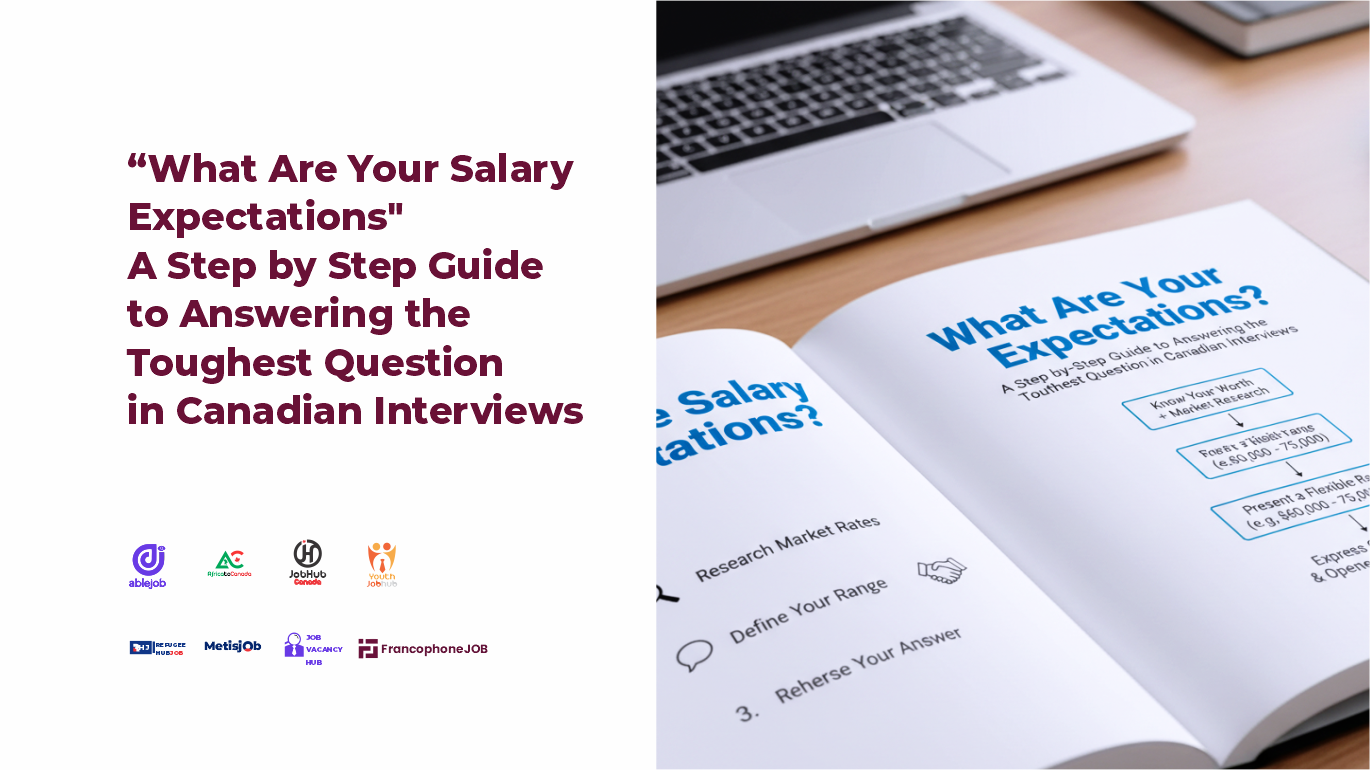October 22, 2025

It’s the question that makes even the most confident candidates pause: “What are your salary expectations?”
Answer too high, and you risk pricing yourself out of the job. Answer too low, and you could end up underpaid for years. In today’s Canadian job market, where pay transparency is improving but not yet universal, mastering this question is a crucial interview skill.
This isn’t just a question; it’s your first real negotiation. In this guide, we’ll walk you through a step by step approach to researching, deflecting, and confidently answering salary expectation questions so you can secure the compensation you truly deserve. Step 1: Do Your Canadian Market Research Never walk into an interview without a number in mind. Saying “I’m open” or “I’m not sure” signals that you haven’t done your homework. Your goal is to find a realistic salary range for your specific job title and location in Canada.
Here are reliable resources to help you:
Canada’s Job Bank: Use the federal government’s Wage Report tool. Search by job title and city (e.g., Marketing Specialist, Toronto) to find low, median, and high salary ranges.
Salary Guides: Recruitment firms like Robert Half, Hays, and Agilus publish annual salary reports breaking down pay by industry, experience, and region.
Crowdsourced Data: Websites like Payscale and Glassdoor offer user submitted salary information. Always check sample sizes and how recent the data is.
From this research, define three numbers for yourself:
Walk away number: Your absolute minimum.
Target number: What you’d be happy with.
High end number: An ambitious but realistic figure based on market data. Step 2: Deflect the Question (Early in the Process) If the question comes up during the first screening call, remember: this is often used to filter candidates based on budget. At this stage, you don’t yet know enough about the role to give a confident answer, so it’s smart to politely deflect.
Try this script:
“I’m really excited to learn more about the role and its responsibilities. Before I provide a number, I’d love to understand the team structure and growth opportunities.
Could you please share the budgeted salary range for this position?”
This approach is professional, confident, and tactful. It shifts the focus back to the employer while signalling that you’re thoughtful and prepared. Many recruiters will appreciate this and share their range. Step 3: Give a Strategic Range (When You Must Answer) If you’re later in the process or the recruiter insists on an answer, it’s time to provide your range, not a single number.
A range invites discussion; a single number sets a limit.
Base your range on the research from Step 1. A good rule of thumb is to make your target number the bottom of your range and your high end number the top.
Example response:
“Based on my research for similar roles in Your City and considering my X years of experience in a specific area, I’m looking for a base salary in the range of 75,000 to 85,000. However, I’m flexible and most interested in the overall compensation package, including benefits, bonuses, and growth opportunities.”
This answer demonstrates that you’ve done your research, value your experience, and are open to discussion – all signs of a strong professional negotiator. Step 4: What NOT to Do (Common Pitfalls) Avoid these common mistakes when discussing salary expectations:
Don’t reveal your current or past salary.
Your previous income doesn’t determine your worth in a new role. In some provinces, it’s even illegal for employers to ask. Redirect politely:
“I’m focused on the market rate for this position and the value I bring to the role, rather than my previous compensation.”
Don’t make it personal.
Avoid phrases like “I just need enough to cover my bills.” Keep the discussion professional and market based.
Don’t sound uncertain.
Phrases like “I’m hoping for maybe around 70,000?” weaken your position. Be confident and state your researched range as fact.
By following these steps, you’ll turn an uncomfortable interview question into an opportunity to show confidence, preparation, and value key qualities every Canadian employer respects.